#really not nice to the Fëanorians
Explore tagged Tumblr posts
Note
Feanorians went after Dior with one Silmaril while Melkor here with two
Like...they used their forces and effords going after someone with a common enemy (Melkor) instead of going after said enemy?
Feanorians keep pullling people into their messes I swear
Their role is to be an unwitting fifth column.
“But Morgoth thought that his triumph was fulfilled, reckoning little of the sons of Fëanor, and of their oath, which had harmed him never and turned always to his mightiest aid; and in his black thought he laughed, regretting not the one Silmaril that he had lost, for by it as he deemed the last shred of the people of the Eldar should vanish from Middle-earth and trouble it no more.” [Silm 293]
#really not nice to the fëanorians#they deserve my scorn#replies#nothing else really needs to be said about those cowards
7 notes
·
View notes
Text
#this was also after c&c utterly failed while going after beren and lúthien#didn't they consider their kid might turn up similar to his parents or what#feral dior is the best dior i dont make the rules (via @armenelols)
Sons of Fëanor attacking Doriath for a shiny rock and coming out of it three brothers short and without said shiny rock. Because they started a beef with a guy who to them was the equivalent of a 10 years old kid in middle school. I would never recover from that
#dior eluchil#really not nice to the fëanorians#they deserve my scorn#it's okay op i'm the hateblog ;)#feral sword prodigy dior is the way to go#the other quote to bring up about these losers failing at their quest#is that the only ones to join Fingolfin in worrying about Morgoth and wanting to attack him instead of playing Settler Overlord#was Angrod and Aegnor not any son of Fëanor#freckin' kinslayings
371 notes
·
View notes
Text
Vagueblogging a website but like do you really think the Sindar who followed the Fëanorians East were following Maedhros, whom they'd just met? Sure, that was a nice gesture handing over leadership, but I'm pretty sure from the Sindar POV he was never really a contender. He's a former thrall after all! Even if the northern Sindar were more sympathetic to thralls, I don't think they'd think it wise to take one as leader. I also don't think the Sindar were particularly in-the-know about the reasons for the Noldor in-fighting (and if so, not a word got to Thingol for ~60 years which I find implausible, even if there was tension there). I think Maedhros' former thrall status would be their main concern about him.
Anyway the point I'm arriving at is that it was Maglor they did ~30 years of cultural interaction with. What did the Sindar call themselves? Lindi, the Singers. Of course they followed Maglor the Singer, Maglor the Poet King. He's the reason the Fëanorians had the benefit of Sindarin allies. Not Maedhros.
190 notes
·
View notes
Text
I Read The Silmarillion So You Don't Have To, Part Nine
Previous part.
Chapter 20: Of the Fifth Battle: Nirnaeth Arnoediad In which Maedhros tries and fails to get the Elves to play nice, and then a battle goes very badly.
This chapter begins with a quick account of what happened to Beren and Lúthien. They are restored to life, and briefly check in on Lúthien’s parents in Menegroth. It had been eternal winter in the forest of Doriath since Lúthien died, but Lúthien brings spring with her. When Melian sees her daughter, it’s like seeing a ghost. Melian feels the most horrible grief that anyone has ever felt in the history of the world, because Lúthien is mortal now. The Elves call Beren and Lúthien “The Dead that Live,” because there’s something deeply unnatural about coming back from the Halls of Mandos. All the Elves are unsettled by them, so Beren and Lúthien go off on their own, into the east of Beleriand. They have a son, Dior Aranel, but beyond that, the Elves never hear of them again. Presumably they live out their natural lives, but no one knows when they died or where they’re buried
That’s the end of that story! Now, let’s return to the Main Plot. Maedhros, the oldest of Fëanor’s sons (the one who lost a hand) has been thinking up new ways to fight Morgoth. Fingolfin proved that Morgoth is not invincible — he can be hurt, so maybe he can be killed, or at least incapacitated enough to stop causing trouble. However, the Noldor don’t stand a chance unless they can band together and fight Morgoth as a unified front. Maedhros tries to call all the Elves together in a council.
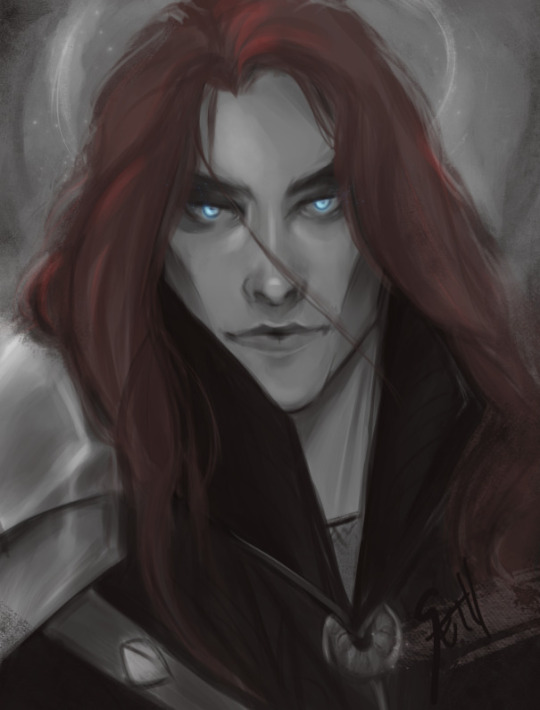
Maedhros by @kazz-art
(Fun fact: According to a YouTube video called “Types of Lord of the Rings Fans” by Generic Entertainment, “Maedhros” is composed of Sindarin words meaning “shapely” and “red-haired,” so it basically means “hot ginger.”)
Of course, the problem is that the Elves have never been unified, and they’re not about to start now. Fëanor’s sons (save Maedhros himself) hate basically everybody, and their shenanigans have burned too many bridges:
Orodreth is now king of Nargothrond after Finrod died, and he says that he’s never going to trust a son of Fëanor ever again. After Celegorm and Curufin’s attempted coup, who can blame him? A small group from Nargothrond, led by an Elf named Gwindor, come to aid Maedhros — but they go behind the king’s back.
Doriath is even more of a lost cause. King Thingol now has a Silmaril, and you know what that means — all of Fëanor’s sons (including Maedhros) are his enemies by default. Melian advises Thingol to surrender the Silmaril, just… y’know… to take that problem off their hands. But Thingol is offended by the Fëanorians’ arrogance, and he’s still very mad at Celegorm and Curufin for trying to steal his daughter. The Silmarils are also kind of like the One Ring, in that anyone who looks at them becomes obsessive and wants to keep them. So, instead of actually listening to his wife for once, Thingol sends the Fëanorians a note that says the Elvish equivalent of “come at me, bro.”
Maedhros carefully ignores Thingol’s threat, because he’s really trying to get everyone to work together. But those two assholes Celegorm and Curufin send Thingol a declaration of war. Thingol fortifies his kingdom and then just stays there, because his solution to everything is to isolate himself behind a magic wall and hope the danger doesn’t touch him. (That worked when Morgoth was a general threat to everybody, but not so much when other Elves want to kill Thingol specifically.) Thingol’s right-hand men, Mablung and Beleg, want no part in whatever shit is inevitably going to go down between Thingol and Fëanor’s sons. So, they’re given permission to leave Doriath (provided they don’t go to serve any of Fëanor’s sons). They go to Hithlum to serve Fingon, and then after that, no one enters or leaves Doriath.
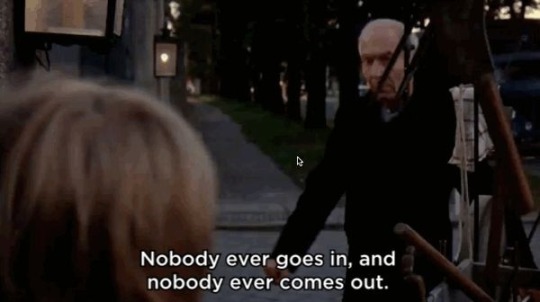
(I know, I know, I already used it!)
But Maedhros has a few unexpected sources of help. He manages to enlist the Dwarves, who have lots of weapons and the means to make them, and he also has the Men on his side. All of them want Morgoth gone as much as anybody (and they haven’t been given any reason to hate Fëanor’s sons yet). Maedhros also has Fingon’s support, because Fingon still loves Maedhros as much as he did back when he rescued Maedhros from the cliff face.
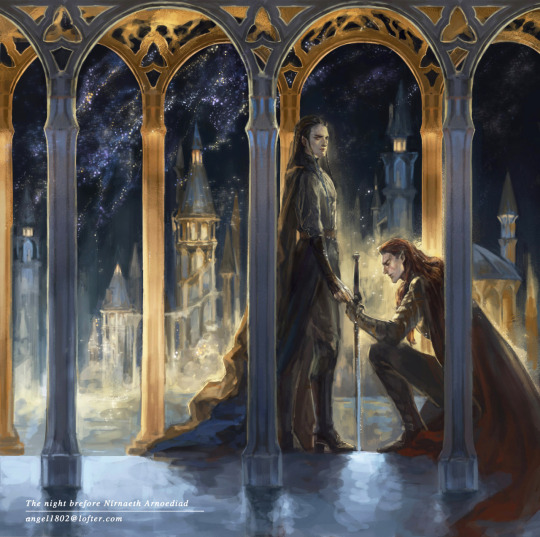
The Night before Nirnaeth Arnoediad, by @pansen1802
The only faction that remains unaccounted for is Gondolin, because it’s the only kingdom that’s even more isolated than Doriath. News of Maedhros’ attempt at unity reaches Gondolin, but King Turgon still refuses to do anything.
Maedhros’ force is smaller than he’d hoped, but better than nothing. It’s enough to get rid of most of the Orcs in northern Beleriand, and it might be enough to try assaulting Angband yet again. Maybe this time it’ll work! Unfortunately, Morgoth knew they were coming. Before the battle even starts, Maedhros’ and co.’s chances are looking bleak. But at the last minute, the cavalry comes! Turgon finally decided to actually do something, and sent a host of ten thousand Elves from Gondolin to help. Fingon is overjoyed to have seen the first sign of his brother’s existence for centuries. He sends up a battle cry in Quenya. Morale is good! There’s a nice moment in which Fingon and Turgon briefly reunite on the battlefield.
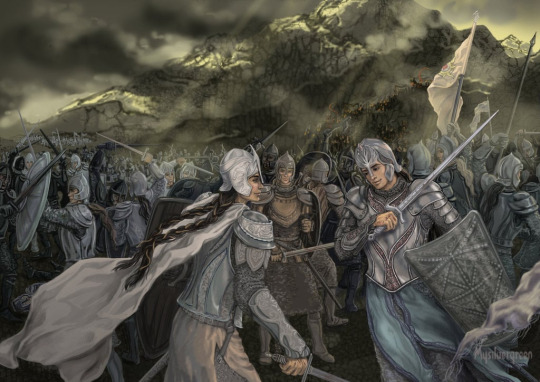
The Battle of Unnumbered Tears, by Mysilvergreen
Unfortunately, it’s all downhill from there. This battle is called Nirnaeth Arnoediad, “the Battle of Unnumbered Tears,” so that should tell you everything you need to know. Fingon’s host retreats, the Men from the Forest of Brethil are nearly wiped out, and then there’s betrayal. This whole time, Morgoth had been trying to wage a psychological battle amongst the Elves and Men, sewing distrust amongst them and making it even harder for Maedhros to get them to come together. “Divide and conquer” has worked well in the past, and it works again here. A man named Ulfang and his sons suddenly turn against Maedhros. Maedhros’ host is cornered, and they’re forced to retreat.
The most steadfast fighting force in the battle turns out to be the Dwarves. If it weren’t for them, the Elves and Men would have been annihilated by Glaurung and the other dragons. A Dwarven lord named Azaghâl manages to stab Glaurung in the underbelly, which wounds him, but doesn’t kill him.
Finally, Gothmog, the Lord of Balrogs, comes out of Angband. He corners Fingon with another Balrog. Fingon fights valiantly, but no one can hold out against the Lord of Balrogs for long. Gothmog cuts Fingon in half with a greataxe. The Elves say that a white flame burst from Fingon’s helmet as it was cloven.
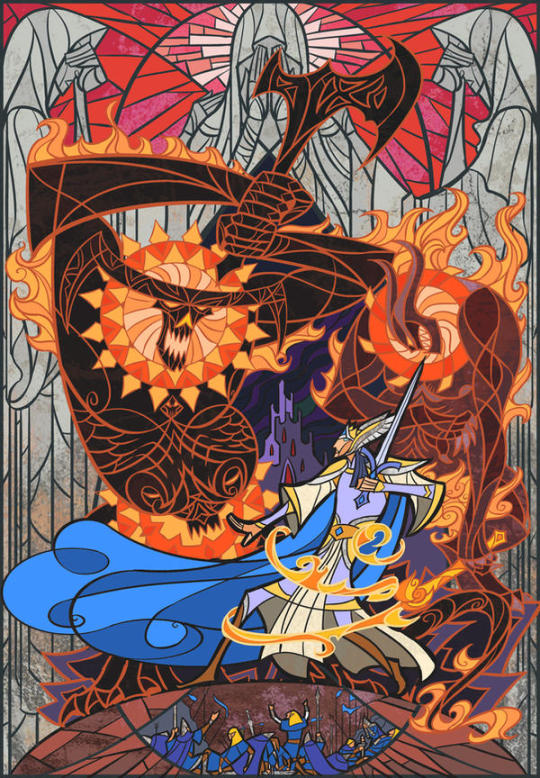
The Final Battle in Unnumbered Tears by breath-art
The battle’s basically over after that. Turgon holds out with the brothers Húrin and Huor to ensure that Morgoth doesn’t win the Pass of Sirion and take control of the river. Húrin tells Turgon to flee, because he’s the last hope for the Elves’ survival. But Turgon recognizes that by sending help, he revealed to Morgoth that Gondolin exists. It won’t take him long to find Gondolin and destroy it. Húrin tells Turgon that Gondolin will still be a beacon of hope for however long it continues to last, and says goodbye, knowing that they won’t see each other again.
Maeglin, Turgon’s nephew (the edgy Elf) is fighting nearby. He hears Húrin say that Gondolin is a beacon of hope, tucks it away in his mind, and says nothing. Ominous.
Turgon retreats, but the Men remain to hold the pass. Tolkien writes that, of all the deeds of Men that were performed for the sake of Elves, this is the most renowned. Some Men betray the Elves, but most of the Men continue to fight for them. Huor and all of the other Men die; Húrin is the last man standing. Húrin yells “Day shall come again!” every time he kills a monster, but the Orcs just keep coming, and they continue to fight him even after he cuts off their arms.

Exactly like this.
Eventually, Húrin is captured alive.
Morgoth is very pleased with himself for having engineered a betrayal. The Elves no longer completely trust the Men, except for the Three Houses that became their friends. Now that Fingon is dead, his realm of Hithlum is completely destroyed. The remaining Noldor of Hithlum (and there aren’t many) scatter, and join the Wood Elves of the East. Living in forests and using guerilla tactics are way less noble than having cities and fighting in armies. The Haladin, the Men of the Forest of Brethil, are also greatly reduced. They never see any member of their host again, or learn what happened to them. Morgoth shuts the treacherous Men in what’s left of Hithlum, forbidding them to leave it, which pisses them off because they wanted to rule Beleriand. Welp, that’s what you get for being a traitor.
One of the only safe places left in Beleriand is the Havens at the mouth of the River Sirion, but Morgoth is eventually able to ransack the Havens using machines with engines (remember, Tolkien thinks industrialization is evil). A handful of Elves, led by Círdan and Gil-galad, manage to escape by sea. They keep a foothold at the mouths of Sirion, but for the most part, Morgoth controls the river.
The situation is so dire that Turgon reaches out to Círdan from Gondolin. He wants to again try to send messengers across the sea to Valinor. Círdan builds ships and sends them west, but again, none of them return… except one. That ship turned back, and sank in a storm within sight of Middle-earth’s coast. One Elf from that ship survives, and he’s ferried to shore by Ulmo, the Vala of Water himself
Although Morgoth won decisively, he’s still not happy -- he wants to capture Turgon, and has no idea where he is. Turgon is the last remaining son of Fingolfin, and therefore the rightful High King of the Noldor. Morgoth’s hatred of the House of Fingolfin is personal, because Fingolfin wounded him, and because they’re friends with Ulmo the Vala. Morgoth also got bad vibes from Turgon all the way back in Valinor. He intuited that Turgon was destined to help destroy him.
Morgoth knows that Húrin is friends with Turgon, and Húrin is his prisoner. He demands that Húrin tell him where Turgon is, but Húrin tells him where he can stick it. In response, Morgoth binds Húrin to a chair on top of Thangorodrim, and curses him and all of his offspring. Morgoth tells Húrin that despair and sorrow will come to everyone he loves. To stick the knife in and twist it, Morgoth gives Húrin a taste of his own power to see the future, and forces him to remain sitting in that chair until all of his family have met their doom. Húrin does not beg for mercy for himself or any of his kin. He won’t give Morgoth the satisfaction.
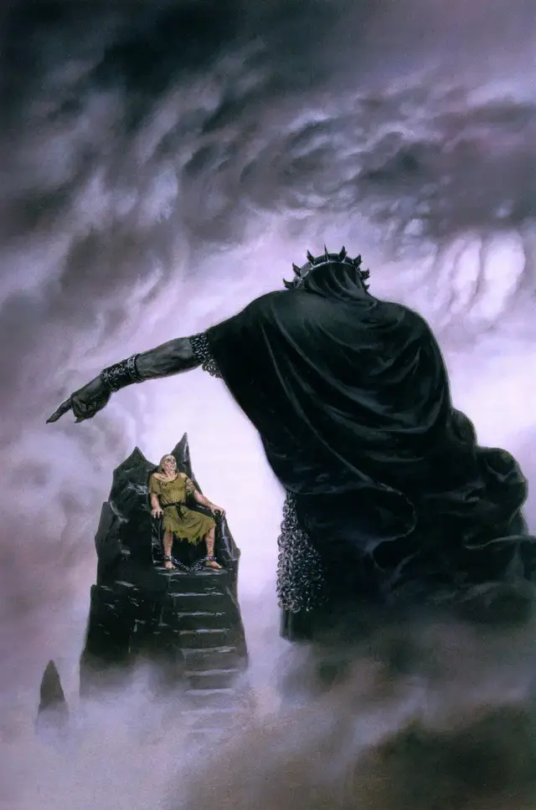
Morgoth punishes Húrin by Ted Nasmith
As a final insult, Morgoth has the Orcs build a giant mount of bodies in the middle of the battlefield. The Elves call it the Hill of the Slain and the Hill of Tears. But after a while, grass and flowers grow on the bodies of the dead.
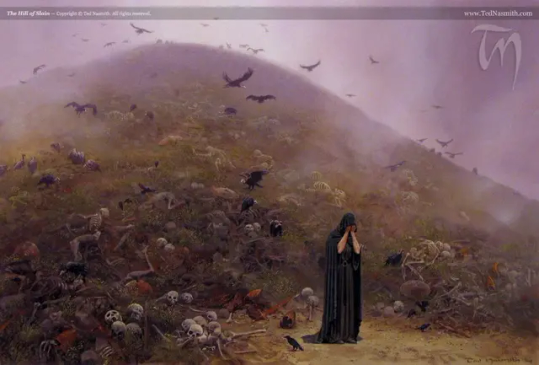
The Hill of the Slain by Ted Nasmith
Chapter 21: Of Túrin Turambar, Part 1. In which our angsty tragic hero tries to outrun his curse, kills people he shouldn’t, sleeps with people he shouldn’t, and fights a dragon.
This is the second of the Great Tales, also called “The Children of Húrin.” I’ve heard that this is one of the most tragic stories in the entire Tolkien Legendarium (which is saying a lot), so brace yourselves! This is going to be another two-parter, because I ran out of space.
Instead of jumping right into the story, Tolkien gives us an account of what happened to Húrin and Huor’s wives, Morwen and Rían. Rían is dead. Huor and Rían’s son is Tuor, and Húrin and Morwen’s son is Túrin. Húrin and Morwen also had a daughter, Lalaith, but she died of disease when she was three. After the battle, the Easterlings (evil Men working for Morgoth, they’re already called that) ransack Hithlum. They enslave everybody except Morwen, because she’s just so beautiful. They assume that she’s a witch, “in league with the Elves.” Despite their fear of her, Morwen decides that her son is not safe, and sends Túrin to Thingol. Morwen is Beren’s distant cousin, so she hopes that Thingol will take Túrin in. After Túrin is sent away, Morwen gives birth to a third child, a daughter named Nienor (which means “mourning.” That’s not ominous at all). Thingol accepts Túrin into his household, because he doesn’t hate Men as much as he used to, and raises him as his own son.
Germanic Fun Fact #1: It was actually a common practice in the early Middle Ages that noble children would be fostered by other families, and it shows up in fiction. For example, Beowulf was fostered by King Hrethel of the Geats, making him a de facto prince.
Túrin lives in Thingol’s court for nine years, and messengers occasionally bring him news of his mother and sister. One day, the messengers stop coming. Túrin puts on his ancestral family helmet, “the Dragon-helm of Dor-lómin,” and goes to battle alongside the king’s captains and the other Elves.
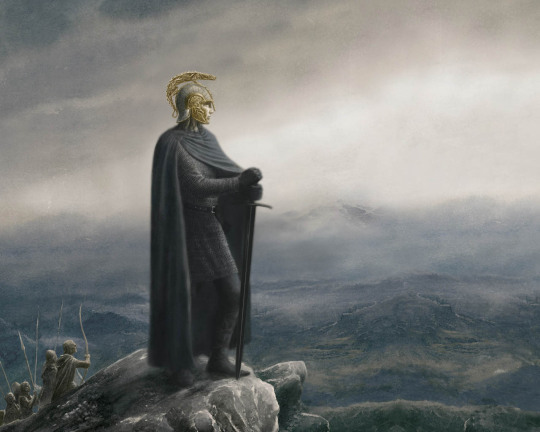
Túrin Turambar by Alan Lee
Túrin stays in the field for three more years, then returns to Menegroth. He looks dirty and unkempt because he’s been living in the wilderness for three years. One of the Elves of Thingol’s court, named Saeros, mocks Túrin for his wild appearance: “If this is what the Men look like, then do their women run like deer, wearing nothing but their hair?” In response, Túrin throws a goblet at Saeros, injuring him. The next day, they confront each other in the forest. Túrin defeats Saeros, and sends him running naked back to Menegroth, wearing nothing but his hair. Irony! As he flees, Saeros falls into a gorge and dies. Now Túrin is responsible for the death of one of Thingol’s courtiers. Oops.
Mablung, one of the king’s captains, advises Túrin to go back to Menegroth and beg Thingol for his pardon. Túrin decides to leave Doriath as an exile, but Thingol pardons him anyway.
He loved Túrin like a son, and would welcome him back if he decided to return. The king’s other captain, Beleg Cúthalion, loved Túrin just as much, and decides to go after him.
In the meantime, Túrin becomes the leader of a group of outlaws. And not the Robin Hood kind. He starts calling himself Neithan, which means “the Wronged.” (Thingol pardoned him, so he hasn’t been “wronged” at all. This is entirely his own fault.) After a year, Beleg finally finds Túrin’s outlaw lair. Túrin didn’t happen to be there at that moment, so the other thugs seized and bound Beleg, assuming that he was a spy from Thingol. When Túrin gets back, the sight of Beleg bound in his lair makes him suddenly repent of all his evil deeds, yada yada, and he swears to never again harm anyone besides Morgoth’s minions. Let's see if that promise lasts more than five minutes.
Beleg tries to convince Túrin to return to Doriath. He’s been pardoned, so he has no reason to hide out in the wilderness. Túrin is too proud to come crawling back, though. He tries to get Beleg to stay with him, but Beleg is tired of his nonsense and tells Túrin to find him on the front lines if he really wants to be with him. They go their separate ways. Túrin heads out towards Amon Rûdh (“Bald Hill”), a large hill overlooking the Forest of Brethil
Beleg returns to Menegroth and tells Thingol everything that happened (except for the part where he was tied up by Túrin’s thugs). Thingol just sighs and says, “What more would Túrin have me do?” Túrin is a hotheaded teenager who ran away from home, leaving his adoptive parents exasperated. Beleg offers to follow Túrin and protect him from a distance. Thingol gives him leave to go, and as a reward for his service, offers him anything he wants. Beleg asks for a fine sword. The king offers him any sword in his armory, save his own. Beleg chooses a sword called Anglachel, made from a meteorite. (Space Sword!) That means that its blade is ominously jet-black. It’s one of two swords made from the same meteorite by Ëol, the Elf of the Dark Forest. (Remember him? He was Aradhel’s abusive husband, and followed her to Gondolin, where he was killed by being thrown from its walls.) Thingol got one of the meteorite swords as payment for letting Ëol live on his land. Ëol’s son Maeglin has the other one.

Anglachel by Elena Kukanova (Thingol is portrayed with blonde hair here.)
As Thingol presents Beleg with the sword, Queen Melian stops to say that the sword “has malice in it.” If you haven’t noticed by now, any work of craftsmanship in Tolkien’s world is imbued, to at least some extent, with the personality of its creator — the One Ring, the Silmarils, the swan ships, and the Two Trees themselves. This sword is no exception. It absorbed all the bad vibes from Ëol. Melian says that it will serve Beleg begrudgingly, and he’ll end up losing it.
In light of that, Melian decides to give Beleg another gift: lembas bread. In the First Age, Melian was the only person with the authority to give out lembas. The leaves it’s wrapped in are marked with her seal, a white flower of Telperion (the Silver Tree). Melian gives Beleg the lembas with the expectation that he will share it with Túrin, which is a big deal — it’s the first of the very few times that Elves have ever shared their waybread with Men. Beleg leaves with the gifts, and spends the winter keeping the Orc population in check. Once spring comes, and the Orcs are no longer an immediate threat, he goes off to find Túrin.
Germanic fun fact #2: Waybread (wegbræde) is actually the Old English name of a broadleaf plantain, a type of edible plant. Tolkien decided to make it into literal bread.
Meanwhile, Túrin and his gang come across three Dwarves. They capture one of them, and one of the Men, Andróg, shoots after the other two. The arrow goes into the dark, and the Men can’t see if it hit or not. The captured Dwarf’s name is Mîm, and he offers to show Túrin his secret cave in exchange for his life. Túrin pities him, and spares him. (Túrin kind of swings back and forth between doing evil things and then regretting it.) Mîm leads the Men up the slope of Amon Rûdh to his secret cave, which “will be” called the House of Ransom. There are red flowers all over the hill, and one of the Men remarks that it looks like there’s blood on the hilltop. That may as well be a massive ‘FORESHADOWING’ sign.
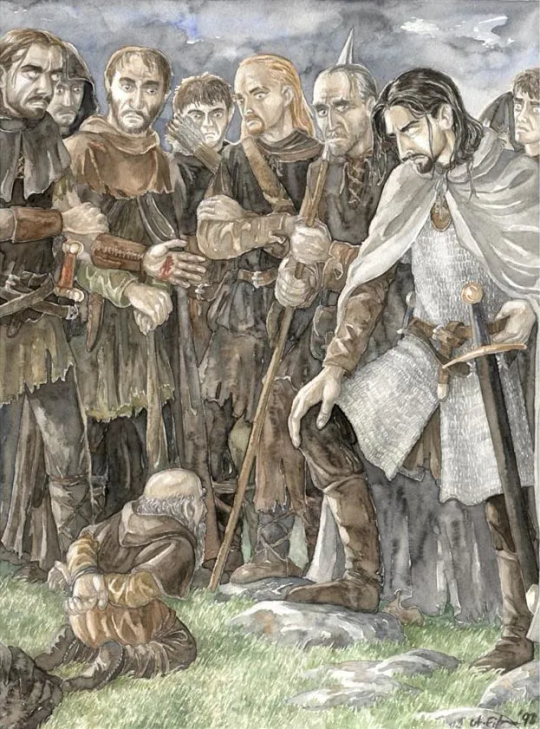
Mîm the Dwarf by Anke Eißmann
Inside the House of Ransom, Mîm shows the Men the body of his son Khîm (Dwarves really like rhyming names), who was shot and killed a few minutes ago. The arrow that Andróg shot into the dark killed Mîm’s son. Oops. What a way to guilt-trip the Men. Túrin feels horrible (you’d think after Saeros he’d learn not to be so reckless). He takes responsibility for Andróg’s arrow, and offers to pay Mîm a ransom of gold for his son. That validates the name of the House.
Germanic fun fact #3: A ransom paid as compensation for someone’s life is called weregild. This was a normal part of life in Germanic cultures. It was a way of preventing endless back-and-forth feuding between families. The gold guarded by the dragon Fafnir in Germanic mythology is weregild that the Norse gods themselves paid to a Dwarf for the murder of his son. (That story shows up in the Prose Edda and the Volsung Saga, parts of it are also in the Poetic Edda, and it’s referenced elsewhere.) Tolkien is definitely referencing that story here.
Mîm is impressed by Túrin’s speech, remarking that he sounds like an ancient dwarf lord, and forgives him to a point, saying that he doesn’t need to pay a ransom after all. He lets Túrin and co. stay in his house for as long as they need.
Now for a little bit of Dwarf history (we’ve had a lot of Elf history, so we need some Dwarf history): The Dwarves that live in the House of Ransom are called “Petty-Dwarves,” which means they’re less cool than other Dwarves. They were banished from the old Dwarf kingdoms in the Misty Mountains, and made their way west to Beleriand. They’ve slowly become shorter and less talented smiths, and they live in secrecy, which Tolkien thinks is ignoble. The Elves used to hunt them for sport, until the other groups of Dwarves showed up. So, the Petty-Dwarves hate Elves even more than they hate Orcs, and they especially hate the Noldor. The Petty-Dwarves originally discovered the caves of Nargothrond before Finrod took it over and forced them out. By now, the Petty-Dwarves have dwindled and basically lost all relevance. Mîm is one of the last and one of the oldest ones left.
In the harsh cold of winter, a hulking man arrives at Amon Rûdh. The Men all spring up to fight, but the man turns out to be Beleg Cúthalion. He only appeared to be a hulking brute because he was wearing a big backpack under his cloak. Beleg and Túrin have a heartwarming reunion, and Beleg gives Túrin his old ancestral treasure, the Dragon-helm of Dor-lómion. Beleg hopes that the helm will remind Túrin that he’s better than this, that he could be something more than an outlaw living in a hole. But it doesn’t sway Túrin at all.
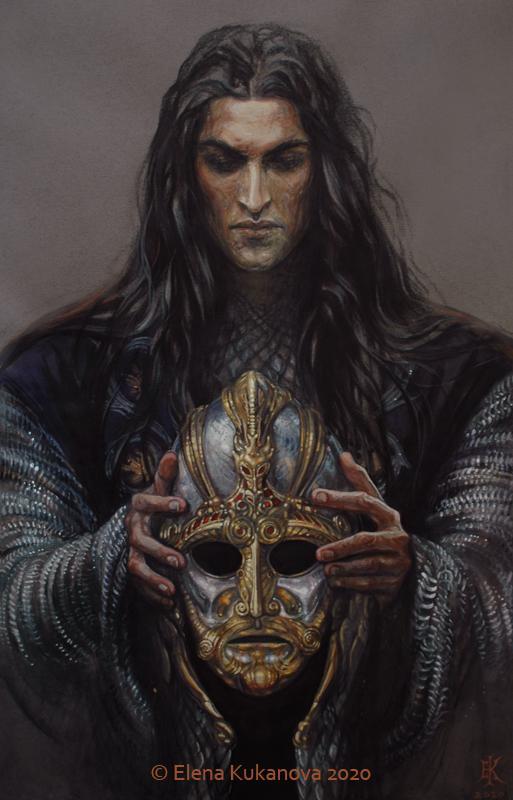
The Dragon-helm of Dor-lómin by Elena Kukanova (This artist’s design of the helm is based on a real Anglo-Saxon helm found at Sutton Hoo.)
Against his better judgement, Beleg stays with Túrin, purely out of love for him. He becomes the team medic, and uses the lembas that Melian gave him to heal sick and injured members of Túrin’s company. (Lembas apparently has healing powers at this point in Elven history.) Mîm the Dwarf is not happy about having an Elf living in his House. Men are one thing, but as I said before, the Petty-Dwarves have every reason to hate Elves.
Meanwhile, Morgoth is still a problem. Túrin and Beleg go out hunting Orcs, and they’re so good at it that they become living legends. Their land becomes known as “The Land of the Bow and Helm,” referring to Beleg’s archery skills and Túrin’s fancy Dragon-helm. Túrin starts calling himself Gorthol (“Dread Helm”), which is a little pretentious. Even the isolated Gondolin has heard of them! Of course, Morgoth eventually hears of them too, and he immediately knows who the fearsome “Dread Helm” is — it’s that upstart kid from the cursed bloodline! He starts laughing, and presumably sits back with his popcorn to watch the shitshow.
Mîm and his son Ibun are promptly captured by Orcs when they go out to forage for the winter. Mîm uses the exact same tactic that he pulled when Túrin and co. captured him — he promises to lead the Orcs to his secret cave, selling out Túrin to the Orcs. To his credit, Mîm does make the Orcs promise not to kill Túrin, but that doesn’t make much of a difference.
The Orcs kill most of Túrin’s company in their sleep. The rest flee to the top of the hill, but most of them are run down and slain, so that their blood covers the top of the hill like the flowers did. The Orcs actually keep their promise not to kill Túrin, and drag him away. Mîm returns to his House to find a massacre, which he’s not too torn up about, because he’s finally rid of the squatters. Everyone’s dead except for Beleg, who is badly wounded on top of the hill. Mîm takes Beleg’s cursed sword and tries to kill him, but Beleg has enough strength left to catch the sword and push it back. Mîm runs like a coward, and Beleg calls after him that Túrin will one day have his vengeance.
Beleg is a strong Elf who knows healing magic, so he slowly recovers. He searches among the corpses for Túrin’s body, hoping to bury him. When he doesn’t find it, Beleg realizes that Túrin is alive, and goes out to look for him a third time. You’ve gotta admire his devotion to this kid who’s a magnet for trouble.
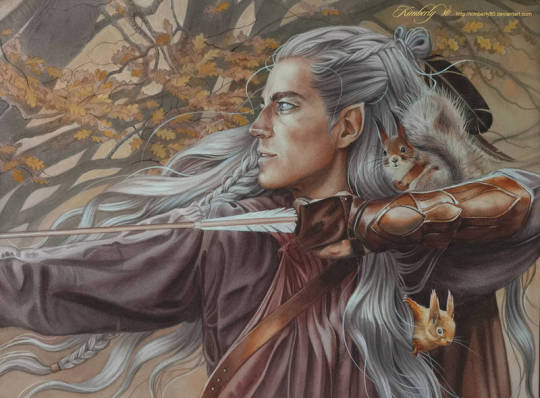
Beleg by kimberly80
Beleg follows the Orcs’ trail all the way to Taur-nu-Fuin, the Forest under Nightshade in the north near Angband. It’s a dark and scary place, but Beleg is such a badass that he can survive it. In the forest, he finds an Elf sleeping under a tree. After Beleg heals him and gives him some lembas, the Elf says that his name is Gwindor, one of the Elves from Nargothrond who went to fight with Maedhros in the Battle of Unnumbered Tears. Captured Noldor are put to work in Morgoth’s mines, since they’re skilled with metals and gemstones. (The Noldor yearn for the mines!!!) Gwindor managed to escape through a secret tunnel, and got lost in the evil forest.
Gwindor gives Beleg some intel about the Orc party he’s chasing, and tries to dissuade Beleg from following them. After all, he knows what awaits them in Angband if they get captured. But Beleg refuses to abandon Túrin, and Gwindor, having finally gotten a smidge of hope, decides to go with him.
Beleg and Gwindor sneak into the Orc camp at the base of the Thangorodrim and carry Túrin out without a hitch. But when Beleg goes to cut Túrin’s bonds with his cursed sword, he slips and snicks Túrin’s foot with the blade. Túrin wakes up to see someone bending over him with a sword, and freaks out, not realizing who it is. He grabs the sword and kills Beleg, his loyal friend who loved him so much that he repeatedly put himself in harm’s way for Túrin’s sake. A storm rages overhead, and a flash of lightning illuminates Beleg’s face. Túrin is completely distraught to see that he killed his friend, and collapses beside Beleg’s body.
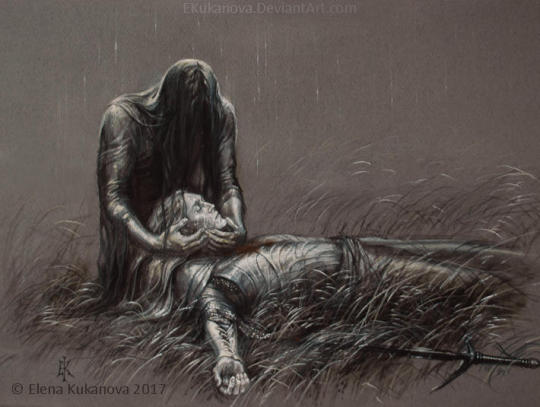
Death of Beleg by Elena Kukanova
In the morning, when the storm passes, Gwindor suggests that they bury Beleg. Túrin is still distraught, but helps bury him right in that spot. They bury Beleg’s bow with him, but take the lembas, and the meteorite sword. Gwindor thinks it’s a shame that such a fine sword should go to waste, and thinks it would be better used to kill the Orcs, and that’ll definitely come back to bite them later.
They go off together, but Túrin is so traumatized that he doesn’t speak. Gwindor looks after him until they reach a magic spring called Eithel Ivrin, which is blessed by Ulmo (the Vala of Water). Túrin drinks from the spring and finally speaks again. He composes a lay to honor Beleg’s life, and sings it at the top of his voice.
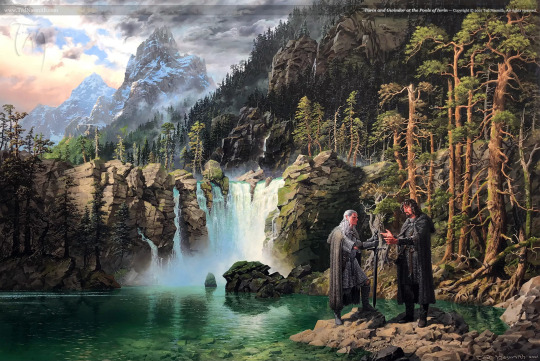
Túrin and Gwindor at the Pools of Ivrin, by Ted Nasmith
Gwindor gives Túrin the meteorite sword, and offers to take him back to Nargothrond. Since he can finally speak, Túrin asks Gwindor who he is, and Gwindor tells him that he’s a thrall who was “once” Gwindor son of Guilin. I think it’s interesting that Gwindor introduces himself this way — he no longer feels worthy of his former identity, and though he escaped Morgoth, he still identifies himself as a “thrall.”
Túrin also asks after his father Húrin. Gwindor doesn’t know any details, but he tells Túrin the rumors that Húrin is imprisoned by Morgoth and that his line is cursed. After everything that just happened, Túrin finds that completely believable.
As they continue to travel, Túrin and Gwindor are captured by Gwindor’s own people, the Elves of Nargothrond. They don’t recognize Gwindor at all — being a slave in Angband aged him prematurely, which doesn’t normally happen to Elves — so they assume that Gwindor and Túrin are spies. The first person to recognize Gwindor is the king’s beautiful daughter, Finduilas, because she was in love with him before he left. Gwindor is welcomed back into the fold. Túrin is allowed to stay, but he doesn’t give the Elves his real name.
Something about Túrin must be really appealing to Elves, because the Nargothrond Elves like him as much as Thingol’s Elves did. Also, Túrin has been a teenager this whole time, and only now does he reach manhood. (Actually, like Aragorn, he’s probably significantly longer-lived than the humans of today are. But still.)
Also, he’s really attractive, like his mother Morwen— he has pale skin and dark hair, gray eyes, and the prettiest face of any Man who’s ever lived. At first glance, you’d easily mistake him for one of the Noldor. (After all the pictures of him looking kind of like Aragorn or Boromir, that came as quite a shock.) I guess he cleans up nicely; he has been living in the wilderness for years.
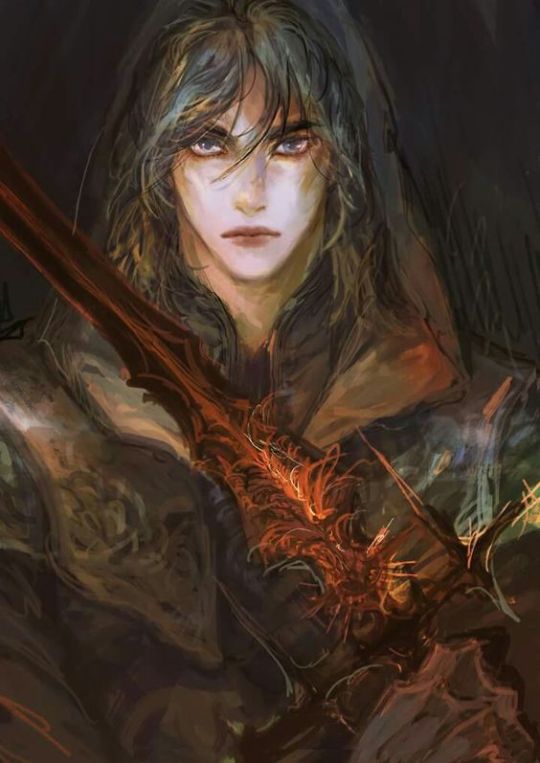
Túrin Turambar by @tolrone
The meteorite sword is reforged, and Túrin renames it Gurthang, “Iron of Death.” He’s so skilled with it that the Elves nickname him Mormegil, “The Black Sword,” which is pretty badass.
Finduilas unwittingly falls in love with Túrin, and out of love with Gwindor. Gwindor catches on, and doesn’t take it personally, but he warns Finduilas about what happened the last time an Elf and a Man fell in love. Túrin may look and act like an Elf, but he’s not one — he’ll die and leave Finduilas alone, and it’s vanishingly unlikely that Mandos will be willing to break the rules a second time. Also, Túrin is clearly cursed, and Beren didn’t have that problem. Gwindor also reveals Túrin’s real name, and tells Finduilas that if she gets mixed up with him, she’s guaranteed to feel the effects of the curse on his bloodline.
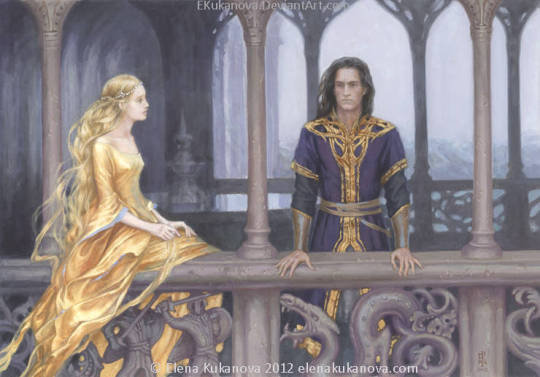
Nargothrond. Finduilas and Túrin by Elena Kukanova
Túrin is very mad that Gwindor revealed his true identity. Gwindor tells him that he’ll attract trouble no matter what he calls himself, so, there’s not much point in using aliases.
When Orodreth, the king, hears who Túrin really is, he’s perfectly happy to have a son of Húrin in his ranks. Túrin becomes more and more important in his court — so important, that he can completely overhaul their method of warfare. Remember, ever since Celegorm and Curufin’s attempted coup, the Nargothrond Elves have practiced mainly guerilla warfare, which is sneaky and dishonorable and all that. So now, because of Túrin, the Nargothrond Elves practice open warfare like civilized people. The disadvantage to this is that, now that the Nargothrond Elves are fighting out in the open, Morgoth knows where they are.
Gwindor is worried by how much influence Túrin has, and sounds the alarm, but no one listens to him anymore and he falls out of favor. Poor guy. He survives Angband, is nice to Túrin, gives him a place to live, and is repaid by Túrin stealing his honors and his girlfriend.
In the meantime Morwen, Túrin’s mother, takes advantage of the unexpected peace caused by her son’s decimation of all the Orcs in the area. She flees to Doriath with her daughter, expecting to find Túrin there. She grieves when she learns that Thingol’s court hasn’t heard from Túrin in years. (They actually have heard of “The Black Sword of Nargothrond,” but they have no way to know that it’s Túrin.) Thingol allows Morwen and her daughter to live in his court, and treats them like family.
Okay, I’m gonna stop there! More coming!
#the silmarillion#the silm#the silm fandom#the silm art#summary#tolkien#jrr tolkien#turin turambar#children of hurin#tragedy#beleg cuthalion#beleg#gwindor#finduilas#nargothrond#maedhros#battle of unnumbered tears#nirnaeth arnoediad#fingon#morgoth#hurin#nienor#germanic mythology#j.r.r. tolkien#middle earth#long post
32 notes
·
View notes
Text
Why doesn't Thingol just give the Silmaril to Fëanorians?
One thing I find curious about the discourse around the Silmarils and their ownership issues is how it seems to often simplify the Sindarin and especially Thingol's perspective. I mean, Thingol giving the Silmaril Beren and Lúthien stole from Morgoth's crown to the Fëanorians is framed as somehow easy and obvious option. But I don't think it really is?
It's not even about whether Thingol is right or wrong to act as he does, it's about why his actions are justified from his point of view (and why it is more believable than him being compliant to Noldor).
1. Noldor disrespected and antagonised Thingol from the start. They have given him little reason to be nice or helpful.
When the Noldor arrive in Beleriand, they immediately start to do their own thing, and disregard Thingol, the local sovereign who is regarded as the overlord or at least respected and revered by the Elves native to this region. But Noldor (and Fëanorians) do not attempt to gain his friendship and alliance, they don't establish diplomatic relationships, they bring no gifts (which would be expected in this kinda medieval based society) and neither do they ask for help as Exiles, they don't let Thingol know where they are going to settle down or ask whether it's convenient but grab lands whether the locals like it or not, they don't recognise his position even as a friendly gesture, they don't disclose the nature of their expedition, withhold important information, and most of all, they bring violent trouble to his backyard. This must seem deeply and outrageously insulting to Thingol, especially because these princes are children and grandchildren of Finwë, Thingol's close friend - and yet they treat him without an ounce of respect.
Thingol is no less proud or particular about his position than Fëanor or Fingolfin is. He probably has not had it challenged or ignored by anyone except Morgoth's servants. Also he may see it as indicative of general Noldor prejudice/disdain against Sindar.
Whether Noldor had justified reasons for the way they act upon landing in Middle-earth, you can't deny that they don't do even the bare minimum to win the locals over. Yeah, you could argue that bringing reinforcements at the time when Morgoth returns and becomes active in Middle-earth again is something, but this is still not a way to treat potential friends and allies.
2. The Kinslaying of Thingol's people and kin at Alqualondë and the burning of their ships.
Obvious, really. He may see himself as standing in for Olwë, and regards the Silmaril as weregild for slain relatives and friends - people he himself probably knew before Teleri were sundered. Also why would he respect Fëanorian property rights when from his point of view, Noldor don't give a damn about Teleri or their rights?
Thingol may also judge that the Kinslaying and burning of the ships disputes the Fëanorians' right to the Silmarils and their moral high ground to a degree where anyone brave and cunning enough to reclaim even one of them becomes a rightful owner. Obviously he is biased in Beren and Lúthien's behalf but it would be weird if he was not? After B&L's efforts and their suffering, and quite literally achieving the impossible, he may be of the opinion that they have more right to the Silmaril than Fëanorians who seem more invested in competing Morgoth for land than for the Silmarils. Thingol may share the same attitude as Dior has in one of the drafts: there are two more Silmarils in the same place where the one in his possession came from, so why don't the Fëanorians go get them first?
3. Celegorm and Curufin.
I mean, after the way Lúthien was abused and attacked by the two brothers, Thingol could be holding on to the Silmaril out of pure spite. His daughter never gets any apology for how she was treated, and Thingol has no reason to believe that C&C's actions - and the attempt to force Thingol into an alliance - were not sanctioned and approved by the rest of the brothers. These people have been consistently terrible at everyone Thingol loves and cares about, so why should he help them in any way?
4. The Silmarils mess with your brain.
It's clear that the Silmarils have an unwholesome effect on almost everyone who possess them. Time and again Tolkien describes how characters fall prey to this greedy, possessive lust for the Silmarils. I mean, Fëanor and his sons are ready to spill blood again and again just to get them back. There is something about the jewels that, if you desire them for their own sake, kind of enslaves you to them. Thingol won't give up the Silmaril to Fëanorians because he can't.
5. The Doom of the Noldor compels him.
It's explicitly stated in the Doom that while the Oath will drive the Fëanorians, it will never yield its objective, and the Silmarils will elude them. As soon as Thingol names a Silmaril as a bride price for Lúthien, he becomes involved in the Doom and what it dictates, limiting his control of the situation. Because of the Doom (and the effect the Silmaril has on him), Thingol is not free to give it to the Fëanorians.
#Elu Thingol#Thingol#The Silmarillion#Silmarillion#that character x/y/z withholds a Silmaril from the Fëanorians is probably more complex than them just being intentionally 'shitty'#or at least in their own perspective they are justified to act as they do#it can be fun to imagine scenarios when x/y/z acted in a different way than they do in canon#(and fanfiction is a handy way to explore those situations)#but as far as the canon (or the many drafts) go#Tolkien usually gives sufficient information to understand the choices made by his characters#and of course there's also this thing: the narrative compels it
29 notes
·
View notes
Text
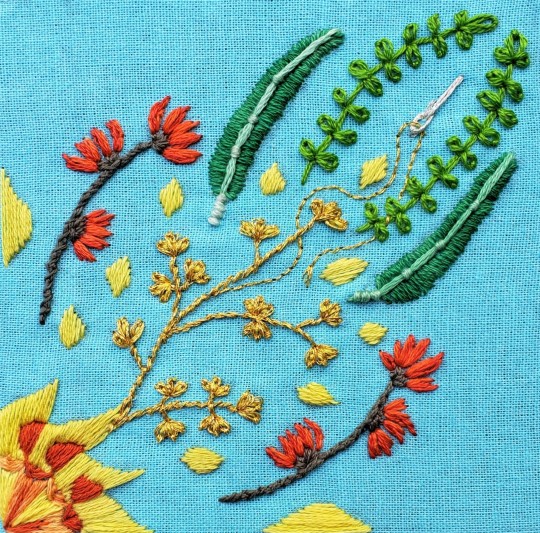

grief and pride - embroidery for @tolkienekphrasisweek day 4, Gardening & Landscape Architecture! I was thinking about memory and how Elves might tell of particular places in adornments on clothing (imagining both of these designs on sleeves.)
First: Years of the Trees Fëanorian ornamentation, reminders of the Gardens of Lórien where Míriel lay, with Finwë's crest.
Second: Late First Age or Second Age Iathrim ornamentation, reminders of Menegroth and the First Kinslaying.
welcome to 'more photos and rambles at length'!!
Working on these little guys for a while I had time to think a fair amount about them. The concept of being literally clothed in one's sorrows feels very Elven and Tolkien to me. It's something about the long years and accumulating griefs, laying claim to and embodying them (powerful!), and the accompanying actions and grudges, and it's a thread that runs through both these groups. Fëanor is one of the first in the narrative to have this sort of memory/shadow on his heart, that of Míriel's passing. I love the similarities and connections between him and Míriel and the way she haunts the story, so I really enjoy the idea of Fëanor (and his sons!) reminding everyone of her absence subtly or unsubtly at every chance, including with their clothing--a mark of family loyalty which is also a nice fuck you to Indis and her children. Lórien is lush and verdant with golden flowers and mountain immortelle, don't @ me silvery tolkiengateway descriptions. I wanted this one to feel bright and vivid to echo the noontide of Valinor and the family's pride and brilliance. Finwë's crest got included in the design partly because it's less complicated than Fëanor's crest (shh), but also because I can completely see Fëanor making a(nother) claim to heirdom by wearing it.
Then of course he sets in motion greater horrors to remember. I am always thinking (@swanmaids has a great post about this) of the support Elwing canonically has in Sirion for her decision not to relinquish the Silmaril. And after seeing the 2nd kinslaying, it had to be a difficult, brave, potentially very controversial decision to hold on to it, but people are with her on this--I imagine motivated partly by real anger and grief over all they had lost and insistence upon memory, pride, dignity, identity etc. which probably remain with the few who survive the Sirion kinslaying too. And remembering Menegroth's beauty goes hand-in-hand with the grief--so I went for a bleaker look here, not the deep forest I usually picture (the 2 green vines, though, symbolizing in my head the surviving royal family/Peredhel!). This design being more of a picture of the place and less "abstract" was an attempt to gesture towards some cultural and stylistic differences in art, etc. I know this one isn't exactly a garden, but if we squint all of Doriath is an enclosed garden, so...!
Also here are the other pics. I'm imagining them bigger, but they are pretty little in real life!
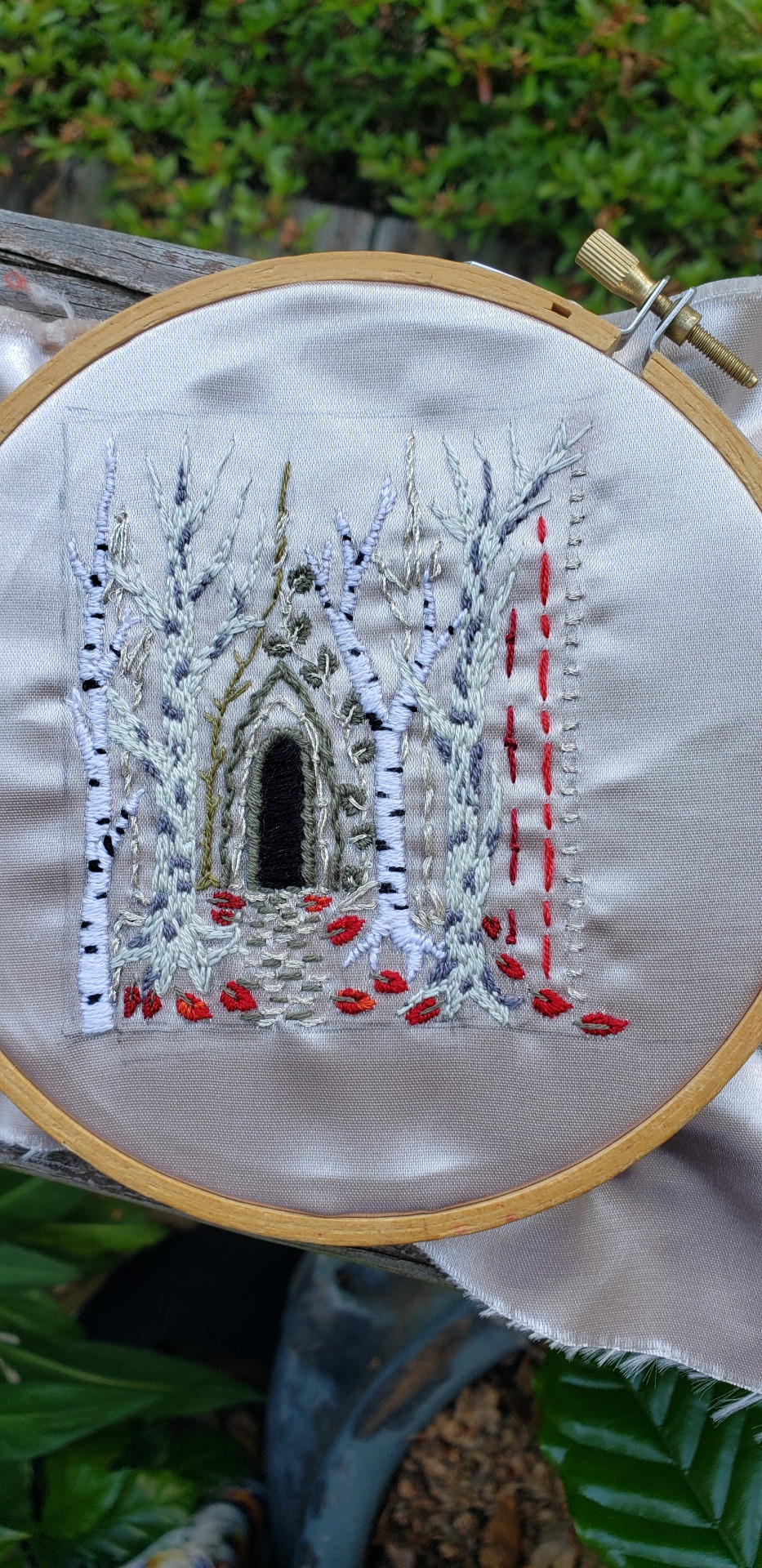

#tolkien ekphrasis week#TEW Day 4#silmarillion#silm#miriel#míriel#feanor#fëanor#doriath#sirion#elwing#etc etc.#i mean--i was thinking of thranduil full disclosure but#thranduil and maglor <3 dressing up the barbies... but !#embroidery#my art#my posts#the silmarillion#menegroth#lórien#estë#este#feanorians#peredhel#there i think now i've captured every possible tag lmao#those are birch & sycamore on the doriath one! i don't know anything about ecology i only know colors#proudest of the little needle and thread for miriel
356 notes
·
View notes
Text
Of firstborns and births.
Fëanor : How did you feel when your first child came into the world?
Maedhros : There were many feelings at the same time. Joy, fear, panic, gratitude, it was too much to process, Artanáro left me speechless since I saw him for the first time, he was too small, more than we expected, however, he was the most beautiful jewel I have ever seen, under Findekáno's words, the baby seemed to be a star itself; and I couldn't agree more with that. While I had seen many babies born up to that point, Ereinion was the most perfect of them all. I felt I could duel Morgoth for him alone, he was the piece I needed to feel alive again.
Maglor : I wanted to cry, correction, I cried too much when I saw it; I was really scared about it. Daeron had not had a really nice pregnancy, and we were afraid that the delivery would be similar. However, thanks to Queen Melian, everything went well. When I finally carried him in my arms, my heart seemed to burst, I am not able to explain how I felt, only that my Lindir was more harmonious than any melody ever played, much more beautiful than Ainulindalë itself. He is magnificence itself, so majestic that many would be humbled to stand in his presence.
Celegorm : Eluréd and Elurín were a blessing from Oromë and Vána, a very unexpected one. I'm not going to lie, when I saw Eluréd it really bothered me not to think that he was the most beautiful baby in middle earth, you know those parents who say their babies were pure beauty, well, I was not one of those, Eluréd and Elurín were not exactly graceful when they were born, they were covered with blood and amniotic fluid, but they were very healthy, that was the important thing, although I can't say I didn't feel joy, they gave me back a part of me that I considered lost.
Caranthir : I must confess that after holding Artaresto already cleaned up, I couldn't help but curse Angaráto's genes. However, I can't deny that the little blonde hair on his little head was lovely. It was really unexpected to see that his cheeks had a tone similar to sweet apples, that made me fall in love with him, I longed too much to put my fingers on his face, I couldn't believe that he was really mine, he was too ethereal, although he was also a fussy baby, a true prince of the Noldor, if you ask me; it was inevitable not to feel proud of him, his mere existence did that.
Curufin : The phrase "You never love anything in the world as much as you love your first child" made sense when Telperinquar was in my arms; although in my heart I vowed to protect him from the moment I began to nourish his Fëa with my own. I know what I felt, a deep love for him, as well as a need for devotion. He was my greatest creation, nothing else I did in the forge compares to him, and even the Silmarils are nothing compared to my son, as I held him, I was aware that I would do the impossible to preserve his innocence, I was sure that he would bring out the best and the worst in me.
°•°
Headcanon's extra :
Daeron is an offspring of Thingol and Melian. Consequently, she has Maia ancestry and thanks to this she was able to father a child with Maglor. (In my AU she is a trans elleth.)
Vána and Oromë blessed Celegorm so that he could have the twins; Dior was puzzled.
Caranthir is trans and Curufin is trans non-binary.
Fëanorian Orodreth!
The other parents of the children :
– Findekáno.
– Daeron.
– Dior.
– Angaráto.
– Findaráto (¿?)
#house of feanor#sons of feanor#feanorians#feanor#maedhros#russingon#maglor#daemags#celegorm#celegorm/dior#caranthir#caranthir x angrod#curufin#curufinrod#erenion gil galad#gil galad#lindir#elured#elurin#elured and elurin#orodreth#celebrimbor#the silm fandom#the silmarillion#silm headcanons#silmarillion#the silm#silm crack#silm au#The silm
32 notes
·
View notes
Text
"Thirdly: because after the death of Fëanor the overlordship of the Exiles passed to Fingolfin (save among the followers of Fëanor’s sons), and he acknowledged the high-kingship of Thingol, being indeed in awe of that king, mightiest of the Eldar save Fëanor, and of Melian no less"
The War of the Jewels, THE GREY ANNALS, p. 25
Always nice to get more tibids on the attitude of the Fëanorians overall (skewing towards a rather consistent trend of not acknowleding Fingolfin's kingship)
That could explain why we do not get any Fingolfin at the Council in Mithrim concering Doriath I guess, but also really reinforces his lack of authority among the Noldor overall (given that he had a firm political stance that did not get mentioned at all there)
Fëanor and Thingol never meeting truly is one of the greatest 'what - if's' of the story, huh (also "in awe of that king", Fëanor would never lmao)
Important to me personally since it reinforces the point of Maedhros and Fingolfin having very much diverging political stances. I mean, compare Fingolfins stance here to Maedhros' infamous:
"Cold seemed its welcome to the Noldor, and the sons of Fëanor were angered at the words; but Maedhros laughed, saying: ‘A king is he that can hold his own, or else his title is vain. Thingol does but grant us lands where his power does not run. Indeed Doriath alone would be his realm this day, but for the coming of the Noldor. Therefore in Doriath let him reign, and be glad that he has the sons of Finwë for his neighbours, not the Orcs of Morgoth that we found. Elsewhere it shall go as seems good to us.’" The Silmarillion, Chapter 13: OF THE RETURN OF THE NOLDOR
Which is explicitly a denounciation of Thingol's capabilities and authority as a king, throughouly breaking it down as:
Thingol was inapable of defending and holding the lands - "Beleriand" - that he claims as his territory and under his authority as king that he is now offering to the Noldor (Maedhros sees Thingol as boasting an empty title as "King of Beleriand" given that he did not manage to defend said claim against military incursion)
It was the Noldor who freed the areas outside of Doriath from Morgoth's Orcs for Thingol to lay nominal claim to again in the first place, therefore only Doriath, the territory he did manage to hold onto himself, counts as Thingol's realm (Maedhros reminds that it was the Noldor who cleared said areas from Morgoth's Orcs and made them liable for habitation and settlement again in the first place, pointing out the military losses of the Lathrim under Thingol where the Noldor succeeded)
Thingol should be glad that it's the Noldor, who will be content to let him rule in Doriath at least, who now populate said lands rather than Morgoth's forces (you could maybe argue that this is a veiled threat, but at the very least it's a dismissal of Thingol being able to enforce his grand claim of authority against the Noldor)
About as much the opposite of being "in awe" at Thingol as it gets.
9 notes
·
View notes
Text
oough hate hate hate maglor as the ‘nice fëanorian.’ i don’t care for fandom woobification in general, but this one just puts me in such a pugilistic curl that i can’t leave it in peace. maglor will always be the most self-victimizing character in the silm to me (imagine a person who is unable to be accountable at such a strong and fundamental level that it transforms or replaces the existing narrative to the point where even the audience believes in their lack of culpability!!) and it really shivers my timbers (negative) to see him be portrayed as the cute kind of pathetic. he’s weak and gross and sad because he’s a manipulative, propagandizing, entirely self-made martyr who suffers out of a desire to be pitied rather than because he’s actually interested in taking responsibility for any of his actions: if he’s a kicked puppy, then he’s the one wearing the steel-toed boots. he doesn’t actually want to get better because that would require accountability, but he needs the security of moral righteousness to feed the old superiority-inferiority complex—so he clings to perennially self-fulfilling, self-perpetuating victimhood….biting n biting and then showing off the wound until someone sympathizes
#the wound and the salt in it can be of the same source is all i’m saying.#maglor#sad disaster boys (and co.)#the silmarillion#the professor’s world#every day i wake up + get on my little soapbox#brought to you by me#wugh….okay….choosing peace….resheathing my blade….
98 notes
·
View notes
Text
State of the Union: Maglor
I did one of these for Curufin a while back, and I haven't really been subtle about who I think Caranthir's married to, so it's clearly high time I complete the trio of Women Who Married Into This Family For Some Reason.
The more I think about it, the more strongly I feel like the Fëanorian wives should be...a little not normal. A little nuts, even. There are plenty of takes where they are the Nice Ones who stayed behind in Aman to provide guilt trips, but I want to see ones who didn't. Ones who came along, who were part of the war - who maybe even were part of the kinslayings if they lived long enough.
And I've mostly seen Maglor's Wives who are Teleri or Noldorin, so on a whim, the one in my head has become Vanyarin.
Her name is Ainalámë (one of her parents must've thought very highly of her), and she grows up not unlike those overachieving piano kids for whom imperfection is Not An Option.
She's very very gifted musically, specifically with voice and zither, and because she's Vanyarin, this means that from about adolescence onward, her life centers around playing music for the Valar on Taniquetil.
Her technical perfection is second to none, but there's always room for improvement, so periodically she'll go elsewhere to study with this or that music master.
Which is how she runs into Makalaurë Fëanárion. Who has spent pretty much his whole life being the greatest musician around, but is open to some friendly competitiveness when Ainalámë shows up.
She is not impressed with this Noldo prince and his virtuosity. Almost at once, it becomes her mission in life to take him down a peg.
Well, fine, if she's going to be like that about it. He'll show her. Her and her boring perfectionism and total inability to improvise and her pretentious name and snooty attitude and no he doesn't fancy her Nelyo, shut up.
What ends up happening is that the ensuing fervent one-upmanship actually makes both of them improve in ways they didn't know were possible. They've both spent ages with everyone around them telling them they were already the best, but now they're having to prove it, work for it.
Makalaurë's technique gets honed razor-sharp. Ainalámë practices until her fingers bleed and it's still not enough, and in desperation she resorts to adding flourishes to match his.
She calls him out on every mistake. He starts calling her Sinyacarë, new-maker, as a dig at her reluctance to deviate from written music.
And, well, she doesn't want to improvise. Improvising means that there's room for error. You can't have error when you're performing for the King and Queen of Arda.
But he's making her eat her words about his precision, so she has to make him eat his about her creativity.
And she does. Once she finally lets go, it's even surprisingly fun. She...doesn't quite remember the last time music was just fun.
Slowly, she and Makalaurë reach a kind of accord. They keep pushing each other, but they collaborate sometimes now, too. He still calls her Sinyacarë, but it's affectionate now.
At some point, she realizes that she doesn't want to head back to Taniquetil. She wants to stay in Tirion and keep on experimenting and trying new things (and seeing Makalaurë - which, when did that become something she wanted?), wants to keep writing music that's about things other than birds and stars and the mighty wisdom of the Valar.
(Not that those are bad things. But they've been her subject matter for decades; she's ready for a change.)
She falls in love with the creative freedom and the lack of pressure before she falls in love with Makalaurë, but that eventually comes along, too.
He's been in love with her since the first time she really, truly lost her cool during a song duel with him and let out a string of wildfire arpeggios that almost got away from her; he knew he was a goner then.
Their courtship is slow, to give her parents time to come around to the idea of her lifestyle changes and to give Fëanáro time to come around to the idea of a Vanyarin daughter-in-law. Insofar as there's any kind of timeline for this, I think they'd start courting not long before Curufin and Kestë meet, but would get married sometime after Curufin does.
Fëanáro's issues with the Vanyar aside, Sinyacarë actually finds she likes Makalaurë's family quite a lot. They're very chaotic, but that means that no one will really notice if she messes something up while she's still finding her feet. And there's music in their chaos; she writes a nocturne that's Ambarussa trying to sneak in late after a hunt, or a fugue that's everyone talking over each other at dinner.
She and Makalaurë mean to have kids. They talk about it. But there's always something going on, always other music to work on, and after all, they have forever.
Until, of course, the Trees go out, and they don't.
Sinyacarë joins in the host going over the Sea without a second thought. What exactly she'll do in Middle-earth, she isn't sure, since she's average at best with a sword, but her husband and his family are going, so she's going too.
The Oath...bothers her a little. There's something about the way it warps the song of the world, and it sounds disturbingly like a twisted version of a marriage vow, and she doesn't like what she can feel it doing to Makalaurë's soul. But it's not like there's anything they can do now.
Alqualondë is a mess. Everything happens very fast, and before Sinyacarë can quite decide what to do, there's a Teler coming at her husband and Moryo from behind with a fishing spear. And then there's not, and she's standing over a body.
Well. No turning back now.
She kills three people that day. She doesn't know their names, but she can never forget the number.
Fëanáro promised freedom when they came to Middle-earth. Fëanáro dies not very long after they arrive. And then Nelyo is gone and Makalaurë is left as a frayed, guilt-wrecked regent.
Sinyacarë might have married a prince, but she never thought that would matter, politically. But she picked up a few things in passing on Taniquetil, and Makalaurë picked up a few things in Tirion, and his (remaining) brothers pitch in and help, and everyone holds things together until Findekáno brings Nelyo back.
When the language shift kicks in, she Sindarizes her name to Saintân. She goes with Maglor to the Gap, and in some ways it's as ideal as Beleriand can get. The pressure of the regency is gone, their family is safe, and they roam free and hold back the darkness with song. Saintân becomes better, much better, with a sword because that's what's needed, and above all else she has always striven for excellence in anything she is called upon to do.
It's not perfect. Nothing in Beleriand is perfect. Morgoth's presence, his dominion, twists the song of it, and while the Sindar and Avari who were connected to the land before Morgoth's return do somewhat better, the Noldor get just a little more twisted in themselves over time. It's worse for those who are Oathbound.
The constant war and threat of destruction don't help either.
Saintân came to Beleriand for her husband and for freedom - the two have always been intertwined, to her - but it's becoming rapidly clear that there's no freedom for the Feanorians without the Silmarils. The gems themselves, she could take or leave, but she wants her family free of the Oath, to be happy again.
So she fights in the Nirnaeth, to try and get the Silmarils back from Morgoth.
When that doesn't work out and they turn to Doriath, she insists on going with them then, too. Maglor tries to talk her out of it, but time has only increased her stubbornness, and she insists that she's going to be at his side just as she was at Alqualonde.
Maglor can never quite forgive himself for capitulating, when she falls in battle with the Doriathrim.
He's incapacitated from the broken marriage bond and can't help Maedhros search for the missing twins, and perhaps it's partially that that leads him to take in another pair of twins a couple of decades later.
Saintân watches the tapestries and adores the peredhil and prays that Maglor will find a way out. She weeps when he ends up alone and burned. Despite her best efforts (she's no Luthien, but she's very good at coming up with irritating songs to sing at Namo), she does not manage to get reembodied anytime soon to go and get him.
But she does make it out of the Halls in time to meet Maglor when he sails with Elrond, and also to meet the son Maglor adopted in her absence.
#silmarillion#maglor#maglor's wife#oc of sorts#loooong headcanons#i need to write something with her and keste showing up on haleth's doorstep for a sisters-in-law chat
36 notes
·
View notes
Text
A Guide from Finrod, Former Lord of Nargothrond

Dear friends, yes, friends, because who else but us is still trying to survive amidst orcs, dragons, and other abominations, including, at times, our own relatives? I know what you're thinking right now. "Finrod, is that really you? The former Lord of Nargothrond, singer, philosopher, tactician, and, well, overall life of the party, why are you suddenly talking about wills?" My answer is — yes, it’s me, and wills are actually an important thing.
Today, I, Finrod, encourage you to think about a noble tradition — writing a will. You might ask, “But why, Finrod? We’re immortal elves, who’s going to touch us?” And I’ll reply: “Listen, if I — an immortal elf — ended up in Mandos, then maybe things aren’t as cloudless as they seem, and having a will wouldn’t hurt!”
So, let’s begin. A will is not just a document; it’s your final word in a world where every third relative is trying to start a coup or, at the very least, marry a dubious character. Examples? Sure: “Don’t let suspicious ladies into your palace.” Celegorm, do you hear me? That’s exactly why you should write a will in advance.
What to Include in Your Will?
First of all, think about what you own. Of course, you’re not obligated to leave behind something like Sauron’s one (and unforgettable) ring, which symbolizes nothing... (yeah, I totally believe that). Make sure you have something valuable. Swords? Magical artifacts? Well, if you at least have a stash of Caranthir's wine, that’s something. Don’t forget to leave it in trustworthy hands. (Just not to Túrin. Honestly, it's scary to trust him even with wooden swords.)
1. Your Personal Belongings.
That famous silver belt you’ve been wearing for so long... Better decide in advance who’ll get it. Don’t repeat my mistakes. And yes, if you have a magical crown, it’s wise to specify who gets it. Otherwise, in a few centuries, one of your heirs might decide to go on a “conquest tour.”
2. Nargothrond.
If you happen to own an underground city (and no, it’s not as fun as it sounds), make sure to clarify what should happen to it when you're gone. Should it stay a tourist attraction or turn into yet another dragon lair? As my experience shows, the probability of a dragon appearing is never zero.
3. Your Pets.
If you’ve got any favorite predatory cats or other mystical creatures (for example, someone's embodiment of dark magic), be sure to leave instructions about who should feed them. Seriously. You don’t want everything to fall apart after you're gone, do you?
4. Family Heirlooms.
For instance, your most prized weapon. If you have several (which is quite common among us Noldor), specify who gets what. Otherwise, you might have a repeat of the story with a certain sword that everyone had their eyes on. Yes, you guessed it right: it’s better to clarify that your saber is not for settling family disputes.
5. Moral Obligations.
Ah, this is probably the most important point. Whatever you decide to leave to your heirs, don’t forget about moral duties. For example, don’t promise anyone they’ll overthrow Morgoth. It may sound nice, but in practice, it causes problems for all your neighbors and relatives. Trust me.
A Few Tips from an Experienced Will Writer:
Who Gets What?
Let’s say you’ve figured out what you own. Now, think about who should get it all. If you want your will to be respected, try to avoid giving things to the Fëanorians — they have a habit of believing everything rightfully belongs to them anyway, and they’re not great at following others’ wishes. Especially if glowing artifacts accidentally fall into your possession.
Specific Requests.
And of course, don’t forget to include specific requests. For example, what you want done with your body. Let me remind you not to ask for any elaborate rituals involving necklaces or magical mushrooms to bring you back. Trust me, those things rarely end well. And if you do end up in Mandos, send Namo my regards and ask if he’s seen Thingol, because ever since he started negotiating with the dwarves, he’s gone off the radar.
What Not to Leave:
Your Songs.
Leaving behind songs is a trend that’s long outdated. Writing new songs? I highly discourage that. Some, like me, have tried, but if you’ve got nagging warriors around who hear the phrase, “Hey, what a song I’ve written,” as “Call more friends and start a revolution,” you might want to think twice.
Enemy Artifacts.
If your will says that your shiny golden artifact should be “kept in a prominent place,” burn that will and write a new one.
Mention Your Enemies.
No, this isn’t about revenge (we’re noble elves, right?). It’s just better to leave instructions on what to do with those who’ve been giving you side-eye for the past millennia. For example, maybe leave Sauron a personal letter. Something like: “Don’t touch my library; it’s too good for your filthy hands.”
Don’t Forget Your Relatives.
Seriously, the moment you're gone, they’ll start dividing your modest estates. Better leave clear instructions on who gets, say, your best blanket or rare instrument collection (Maglor, if you’re reading this, don’t touch my collection — let’s start with that).
Add a Clause on Who Not to Invite to the Funeral.
Why not? It’s important! Some people really shouldn’t be invited to such ceremonies. For example, Tevildo — not the company you want at such an event. As wonderful as cats are, they can really spoil the mood.
Sample Will:
And so you don’t think I’m joking, here’s an example:
Will of Finrod Felagund
“I, Finrod, former Lord of Nargothrond, a great fan of chess and Go (how’s that for a twist, dear heirs?), being of sound mind and good memory (I hope), do solemnly bequeath:
1. My trusty sword — to someone who doesn’t plan on staging bloody dramas or vengeful campaigns to Angband. Besides, I hardly used it.
2. My books — to Galadriel. Though I know you probably won’t read them, let them be yours anyway. After all, you’re my sister, even if a bit headstrong.
3. My chess set — to those who’ll finally realize it’s an intriguing game. Though, considering the local crowd, I’d be happy if anyone even learns how the knight moves.
4. And lastly, if you decide it’s worth bringing me back from Mandos... think again. Or maybe twice.”
Conclusion:
Writing a will is a noble and very useful endeavor. It’s like a chess game with orcs — you don’t know who’s going to win, but well-thought-out moves increase your chances of success. And remember: if you write your will in advance, you’ll sleep soundly knowing your relatives won’t fight over the family silver, and your friends won’t confuse your last wishes with something you said over a cup of wine.
Now, if you’re ready to write this important document, I suggest arming yourself with patience and a good quill. Once it’s done, you can finally rest in peace. No matter where you end up: at Namo’s in Mandos, at yet another party with Elrond, or, heaven forbid, playing chess with Sauron. Good luck, friends, and may the Valar guide you in this tricky matter. Or at least not make it too complicated.
#art#lord of the rings#the silmarillion#tolkien#fanfic#silm fic#silmarillion#finrod felagund#finrod#findarato#ingoldo#dark humor#the silmarilion#the silm fandom#maglor#kanafinwe#makalaure#galadriel#artanis#celegorm#turkafinwe#lort#lort of the rings#nargothrond#sauron
8 notes
·
View notes
Note
Do you Think Elf!Gaston feel offended that a mere mortal man and a a elf maiden did something they could not?
He must have been so prissy about it lol
The list of things that would offend elf!Gaston is very long and most of them in some way highlight his flaws and failures.
We also have this direct quote about the immediate post-quest timeline when Maedhros and Fingon are trying to put together the alliance to attack Morgoth which turns into the disastrous Fifth battle:
Celegorm and Curufin vowed openly to slay Thingol and destroy his people, if they came victorious from war, and the jewel were not surrendered of free will. Then Thingol fortified the marches of his realm, and went not to war, nor any out of Doriath save Mablung and Beleg, who were unwilling to have no part in these great deeds.
So yeah, threats that do border onto that extremity that gets tossed around freely. The Silm makes no question of the prissy jealousy of what Beren and Lúthien did. Remember that Fëanor at the start of this war was fueled by xenophobic hatred towards mortals, using that as a political campaign tactic, and that Celegorm and Curufin were one of the few Noldor leaders to never ally with mortals. Clear winners of Beleriand's Most Racist Elves.
2 notes
·
View notes
Text
#jrr tolkien#tolkien#theelvenhaven#the silm#the silmarillion#silmarillion#silm#feanorians#Feanor#Nerdanel#Maedhros#Maglor#Celegorm#Caranthir#Curufin#amrod#amras#Finwe
154 notes
·
View notes
Text
Arafinwëan caffeine habits
Finarfin: Makes a large glass pot of jasmine pearl tea every morning and sips it while going through the morning’s work from a handmade cup Indis gave him. Will drink coffee socially but doesn’t particularly like it. Orders whatever everyone else is having.
Eärwen: Strong black tea with honey in the mornings, iced in summer. Enjoys a matcha latté now and then, unsweetened, but only if she’s confident the café prepares it properly.
Finrod: Doesn’t really need caffeine but loves the Expérience of the café. Scans the menu for something he’s never tried and enthusiastically asks the barista what it is and whether they like it, and what’s their favourite drink? And what about their favourite pastry? He’ll have one of those please, and another half-dozen to-go (for friends/family/colleagues, of course). Likes to have his order to stay when there’s time and if it's busy will happily take the excuse to ask someone sitting alone if he can join them.
Orodreth: Makes his own coffee in a percolator, for some reason. If found ordering it, he speedruns a full emotional arc in the four seconds it takes to approach the counter then hastily orders a drip coffee. Becomes nervous when asked what roast, size, and whether he needs room, even though he always gets medium roast medium size and always takes cream. Never says anything if the barista gets his order wrong.
Angrod: Americano, black. Latté with coconut or equally unusual flavouring if he’s feeling interesting. Will tell the barista if they get his order wrong. Nicely -- if a little intensely.
Aegnor: Enables Fingon’s cola habit because he, too, has one. Or had. He immediately gave it up when Andreth looked askance at the three 2L bottles in his refrigerator. Now limits to two cups of drip coffee in the morning. Sometimes three. Okay maybe four, on really long days. Lactose intolerant but can't stand black coffee or alternative milks, and will use regular milk and suffer if lactose-free isn't available.
Galadriel: Triple-shot espresso with a teaspoon of sugar every morning. When not in need of a good hit of caffeine, she enjoys a chai latté but, like her mother, only if the café knows how to make a good one. None of that chai concentrate crap.
Nolofinwëans | Fëanorians
119 notes
·
View notes
Text
New fic idea: Gil-Galad is crowned very, very young, so when M&M bring the twins to him and see him, their immediate reaction is "who put this child in charge of a country? change of plans, you're adopted too."
Gil is obviously outraged at being kidnapped by Fëanorians, but being high king was so stressful, and it is really nice to not have all that responsibility, and to have parents evil kinslayers who take care of everything and protect him and hug him...
188 notes
·
View notes
Text
Thinking about that line in the Shibboleth of Fëanor that even his sons might not have all adhered to the old-fashioned thorn pronunciation after his death - which immediately raises the question, so which ones did?? Random headcanons only vaguely supported by anything in the text below.
(Disclaimer that this all obviously became somewhat moot when Thingol’s Quenya ban came into play. Using crispy Amrod canon here.)
Maedhros: there are pages I could write on Maedhros’ complicated relationship with his father and his father’s legacy, it absolutely fascinates me. Initially Maedhros is the son of Fëanor who most openly defies his father - he stands aside at Losgar, he goes to parley with Morgoth literally as soon as Fëanor is dead, and, most notably, he gives the crown to Fingolfin. These are not the actions of a dutiful eldest son devoted to his father’s memory, which makes me fairly confident in saying that Maedhros definitely dropped the thorn post-Thangorodrim. It’s a fairly minor gesture of reconciliation compared to dispossessing his entire house, and I really don’t think Maedhros has many fucks left to give about linguistics after decades hanging from a cliff.
How did this change, say, post-Nirnaeth when there were effectively no descendants of Indis left to make nice with? I don’t know, but I rather like playing with the headcanon that Maedhros started using the thorn again in the last century or so of his life, especially when his mental state was particularly bleak.
Maglor: I don’t think Maglor’s feelings about his father were much less complicated than Maedhros’. He’s specifically noted as hanging out with Finrod and being trusted by Maedhros not to cause a scene at the Mereth Aderthad, suggesting that he very much follows Maedhros’ lead in reconciliation with the other side of the family. On the other hand, Maglor has always been rather fascinated by his dead grandmother, and he maintains that people’s names should be pronounced the way they want them to be pronounced. Also, several of his older works contain puns that absolutely hinge on the th/s distinction. He doesn’t drop the thorn.
Celegorm: actually never used the thorn consistently in the first place, a constant source of annoyance for his father. Celegorm values fast and efficient communication over linguistic precision - if foxes don’t have a word for what he wants to express, he’ll borrow one from Dog. Meaning over pedantry. Prescriptivism is stupid. He’s one of the fastest of the sons to pick up Sindarin, and displays zero interest in actually studying it. Post-reconciliation of the Noldor, he uses the thorn when the distinction is necessary for clarity, and doesn’t otherwise. Everyone is used to this.
Caranthir: I could go either way here, not having many headcanons about Caranthir’s relationship with his father. Since he’s not particularly on board with Maedhros’ efforts at diplomacy, let’s say he keeps the thorn, purely because nobody can tell him what to do.
Curufin: absolutely does not drop the thorn, that was his father’s hill to die on which means it’s his too. Is constantly furious with his brothers whenever they mispronounce something, this is personal, how can they just betray everything Fëanor stood for like that?? Will fully march Tyelpë out of the room if non-Fëanorian Quenya is being spoken there, his child’s ears are Pure and will not be Sullied with Improper Language. The Fëanorions are generally annoyed by Thingol’s Ban, but at least it gives Curufin a new target for all his linguistic aggression.
Amras: has never forgiven his father for Losgar and never will. Drops the thorn out of pure spite.
#silmarillion#meta#my meta#shibboleth of feanor#maedhros#maglor#celegorm#caranthir#curufin#amras#the line of miriel#is going to be my feanorian feels tag
168 notes
·
View notes